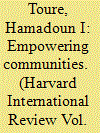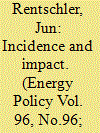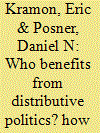|
|
|
Sort Order |
|
|
|
Items / Page
|
|
|
|
|
|
|
| Srl | Item |
| 1 |
ID:
193024


|
|
|
|
|
| Summary/Abstract |
The Republic of Korea Government implemented a universal consumption subsidy program to combat the coronavirus disease 2019 (COVID-19) economic downturn in 2020. Using granular, micro-level transaction data, we find that the subsidy scheme has stimulated household consumption immediately after receipt. Moreover, lower income groups demonstrate higher marginal propensity to consume than middle and higher income groups; this holds true even when creating synthetic control groups that model rational spending behavior. This can have a significant implication on the effectiveness of fiscal impulse. Using income and average historical credit card spending, we also demonstrate credit and liquidity constraints are major factors affecting consumption responses.
|
|
|
|
|
|
|
|
|
|
|
|
|
|
|
|
| 2 |
ID:
159760


|
|
|
|
|
| Summary/Abstract |
Ghana discovered oil in 2007 and began to produce and export it in commercial quantities in 2011. Following its oil discovery, scholars and experts feared Ghana might fall into the trap of the ‘natural resource curse’, the observed tendency for nations endowed with and heavily dependent upon oil or mineral resources to experience slow economic growth. Accordingly, various policy options to manage the oil revenues in order to avert an oil resource curse have been proposed. This paper uses data from the 2012 Afrobarometer Surveys (Round 5) in Ghana to explore the extent to which institutional trust and perceived corruption influence public preferences for cash transfers from Ghana’s oil revenues. Results from ordered logistic regressions reveal that a unit increase in perceived public corruption increases the odds that a respondent would ask that cash transfers be made to all Ghanaians from the oil revenues by about 1.3%.
|
|
|
|
|
|
|
|
|
|
|
|
|
|
|
|
| 3 |
ID:
119910


|
|
|
|
|
| Publication |
2012.
|
| Summary/Abstract |
The role of Information and Communication Technologies (ICTs), particularly broadband, in boosting economic growth and national competitiveness is now widely recognized. The ICT infrastructure is today both a vital national asset and an investment in a nation's future competitiveness in the growing global digital economy.
|
|
|
|
|
|
|
|
|
|
|
|
|
|
|
|
| 4 |
ID:
143568


|
|
|
|
|
| Summary/Abstract |
Recent geopolitical and economic changes have altered global social policy formation. The Bretton Woods multilateral development agencies (MDAs) have selectively incorporated ideas emerging from developing country states and decision makers, with a recent increased acceptance of social transfers as part of renewed efforts at poverty alleviation based on social risk management. There has been an instance in the use and promotion of conditional cash transfer (CCT) policies by MDAs. CCTs were a product of the emergence of a neo-structuralist welfare regime (understood as an ideal type) in Latin America – an attempt to reconcile neoliberal strategies of development with aspirations for guaranteed minimum incomes. The Bretton Woods and regional development bank MDAs have facilitated the adoption of CCTs in other developing countries, including the Phillipines. Here, a combination of actions by national political actors and MDAs has resulted in the implementation of a securitised and compliance-focused version of CCTs derived from the Colombian security state. Although poor Philippine households welcome income assistance, CCTs have acted to enforce further state monitoring without altering the national-based political and economic processes that replicate poverty.
|
|
|
|
|
|
|
|
|
|
|
|
|
|
|
|
| 5 |
ID:
176113


|
|
|
|
|
| Summary/Abstract |
This paper evaluates the effects of cash transfers program, that is, the Benazir Income Support Program (BISP) on environmental poverty using household data. A multidimensional environmental poverty index (EPI), based on four dimensions of environmental services, namely, dwelling, water, sanitation, and energy, is developed using the Alkire-Foster method. EPI shows that about 57% of households face multidimensional environmental poverty in the sample group. Our empirical analysis, based on regression discontinuity design, indicates that BISP cash transfers have a negative and significant impact on environmental poverty. This empirical evidence implies that cash transfers increase the use of environmental services among BISP beneficiaries. The effects of cash transfers on environmental poverty vary from one province to another, which emphasizes the importance of regional differences and heterogeneities. The impacts of BISP cash transfers on various dimensions of environmental poverty, such as dwelling, water, sanitation, and energy, also differ across provinces. The government should expand social protection programs to overcome environmental poverty with a focus on the use of environmental services. However, any efforts to reduce environmental poverty through cash transfers may depend on household preferences and availability of environmental services.
|
|
|
|
|
|
|
|
|
|
|
|
|
|
|
|
| 6 |
ID:
149977


|
|
|
|
|
| Summary/Abstract |
Since fossil fuel subsidy reforms can induce significant distributional shifts and price shocks, effective compensation and social protection programs are crucial. Based on the statistical simulation model by Araar and Verme (2012), this study estimates the regional variability of direct welfare effects of removing fuel subsidies in Nigeria. Uncompensated subsidy removal is estimated to increase the national poverty rate by 3–4% on average. However, uniform cash compensation that appears effective at the national average, is found to fail to mitigate price shocks in 16 of 37 states – thus putting livelihoods (and public support for reforms) at risk. States that are estimated to incur the largest welfare shocks, coincide with hotspots of civil unrest following Nigeria's 2012 subsidy reform attempt. The study illustrates how regionally disaggregated compensation can be revenue neutral, and maintain or reduce pre-reform poverty rates in all states. Overall, it highlights the importance of understanding differences in vulnerability, and designing tailored social protection schemes which ensure public support for subsidy reforms.
|
|
|
|
|
|
|
|
|
|
|
|
|
|
|
|
| 7 |
ID:
121600


|
|
|
|
|
| Publication |
2013.
|
| Summary/Abstract |
Papers in the burgeoning empirical literature on distributive politics often focus their analysis on the pattern of distribution of a single patronage good-for example, cash transfers, roads, education spending, electrification, or targeted grants. Yet because governments can favor constituencies through the targeting of multiple public and private goods, drawing general conclusions about distributive politics by investigating just one (or even a few) good(s) can be misleading. We demonstrate the severity of this problem by investigating a particular manifestation of distributive politics-ethnic favoritism-in a particular setting-Africa-and show that the conclusions one draws about who benefits from government allocation decisions can vary markedly depending on the outcome one happens to study. Our findings suggest the need for caution in making general claims about who benefits from distributive politics and raise questions about extant theoretical conclusions that are based on empirical work that focuses on a single distributive outcome. The findings also provide a foundation for a new research agenda aimed at identifying the reasons why political leaders choose to favor their supporters with some public and private goods rather than others.
|
|
|
|
|
|
|
|
|
|
|
|
|
|
|
|
|
|
|
|
|